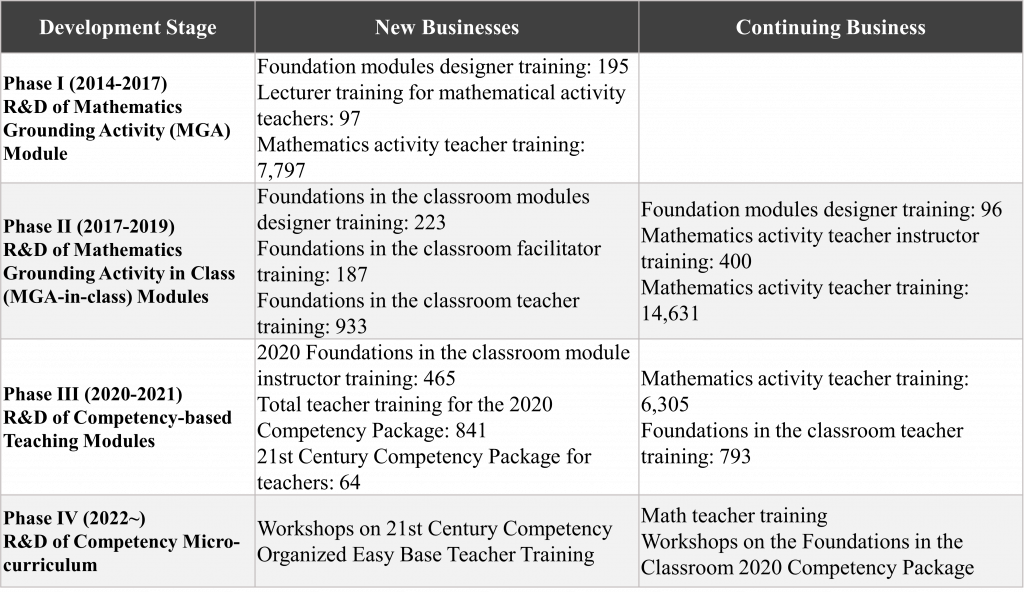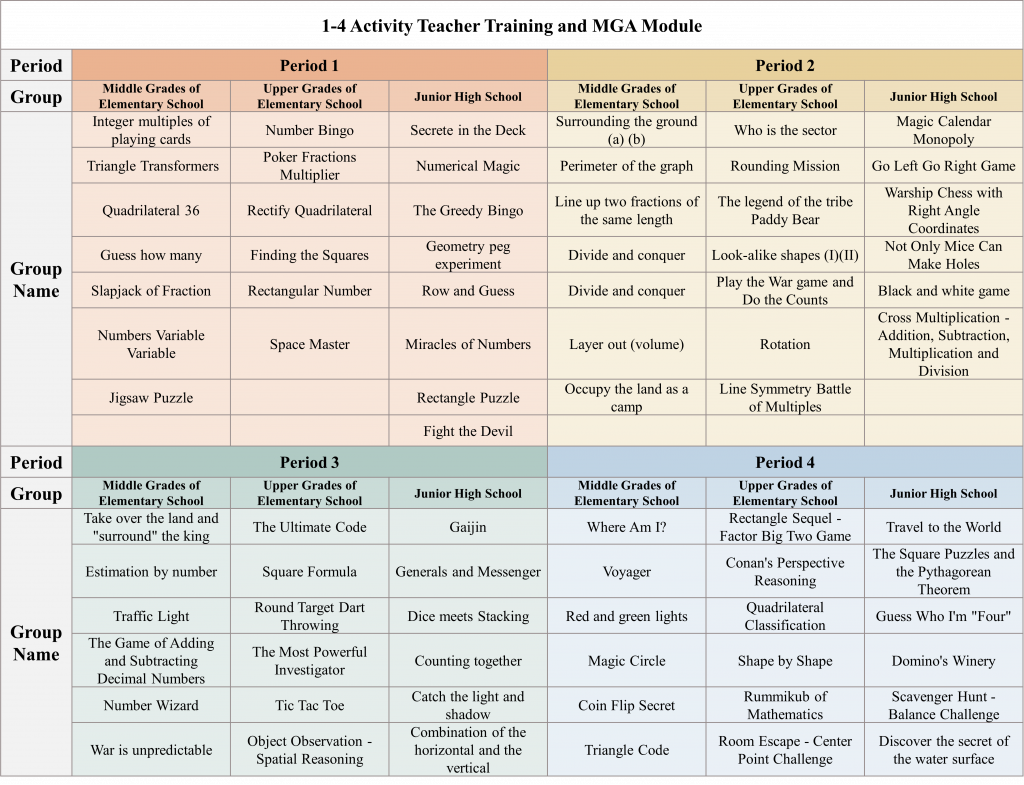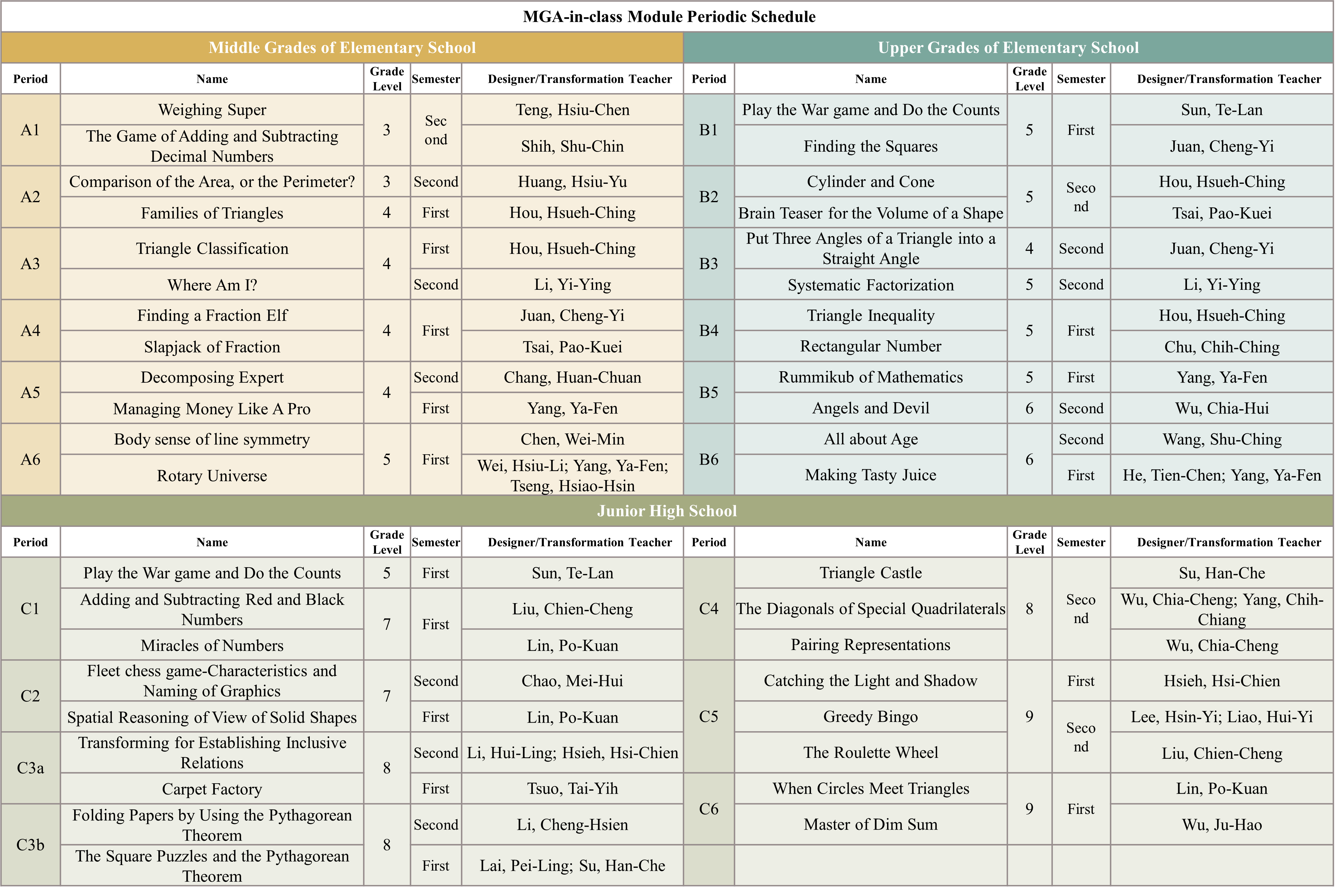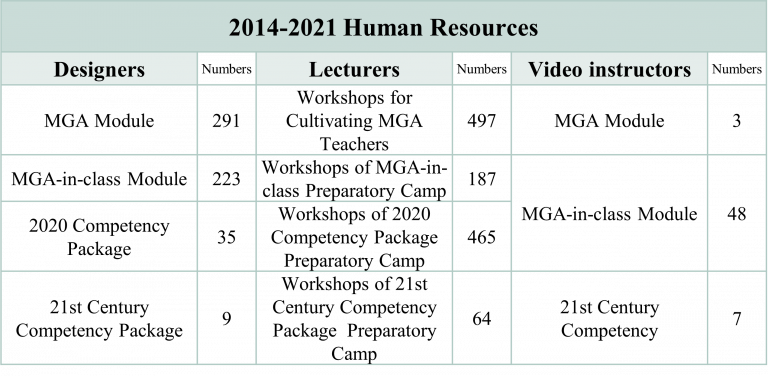Teacher Professional Development

Overview
The “Math Foundations Module” and “Math Foundations in the Classroom Modules” developed by the “JUST DO MATH 1.0: Math Foundations Module Development and Promotion Project” are used as workshops for Math Activity Teachers, Math Foundations in the The mathematics foundations modules are used as teaching materials for the mathematics activity teacher workshops, the mathematics foundations in the classroom workshops, the 2020 Literacy Package facilitator training, and the 2020 Literacy Package preparation workshops. The mathematics foundation modules are based on the mathematical content of the 12-year basic national education curriculum (e.g., n (numbers and quantities), s (space and shapes), g (coordinate geometry), r (relationships), a (algebra), f (functions), and d (data and uncertainty)), and are designed to provide students with opportunities for mathematical practice and inquiry, and to The materials are designed to provide students with opportunities for hands-on work and inquiry in mathematics, and to promote students’ confidence and positive attitudes toward exploring mathematics. Teachers who participate in the training and workshops are expected to improve their knowledge of mathematics teaching as well as their ability to teach mathematical literacy.
1. Mathematics Activity Teacher Workshops
(1) Objective: We hope that through interesting mathematical activities, students who are not well prepared for learning mathematics can build up their interest and pre-experience in learning mathematics.
(2) Target: Elementary school teachers, junior high school teachers, substitute teachers, and intern teachers who have a teacher’s certificate in mathematics.
(3) Study content: The “Math Foundations Activity Module” developed by the “JUST DO MATH 1.0: Math Foundations Activity Module Development and Promotion Project” will be used as the training material for mathematics teachers.
(4) Study methods:
① NTNU SDIME visits all counties and cities in Taiwan.
② Collaboration with county and city counseling groups.
③ School-wide training in cooperation with schools in each county.

2. Math Foundations in the Classroom Workshop
(1) Objective: This workshop is designed to develop the ability of mathematics teachers in elementary schools as well as junior high schools and cultivate their skills of mathmetics literacy teaching. Through the integration of mathematics foundations in the classroom modules and the 12-year National Education Mathematics Curriculum, the workshop will be conducted through lectures, lesson observations, lesson planning, collaborative preparation, and discussions. The purpose of this course is to help elementary and middle school teachers to effectively connect to the 12-year National Education curriculum and to help students to develop their mathematical learning experience through interesting mathematical activities, to increase their willingness to learn, and to develop their mathematical literacy.
(2) Target: Elementary school teachers, junior high school teachers, substitute teachers, and intern teachers who have a teacher’s certificate in mathematics.
(3) Study content: The “Math Foundations in the Classroom Activity Module” developed by the “JUST DO MATH 1.0: Math Foundations Activity Module Development and Promotion Project” will be used as the teaching material for the Math Foundations in the Classroom Co-Preparation Workshop.
(4) Study methods:
① NTNU SDIME offers courses in all counties and cities in Taiwan.
3. 2020 Literacy Foundation Package Workshop
(1) Objective: This workshop is designed to develop the ability of Junior High School elementary mathematics teachers to teach mathematical literacy. Through mathematics foundations in the classroom modules and the mathematics curriculum, we will develop formative assessments and teacher intervention strategies that can facilitate the development of mathematical literacy, in order to help elementary and middle school teachers to effectively connect to the 12-year national education.
(2) Target: Elementary school teachers with teacher’s certificates, junior high school teachers with mathematics teacher’s certificates, substitute teachers, substitute teachers, and intern teachers.
(3) Study content: The “Math foundations in the classroom activity module” developed by the “JUST DO MATH 1.0: Math Foundations Activity Module Development and Promotion Project” will be used as the teaching material for the 2020 Foundations Workshop.
(4) Study methods:
① NTNU SDIME offers courses in each county and city in Taiwan.
② The study will be conducted in conjunction with the mathematics field time of the local counseling teams in each county and city.

4. 2020 Literacy Package Instructor Training Workshop
(1) Objective: SDIME hopes to lead the co-teachers of the “Literacy Package” through this workshop.
Teachers who have the qualification of “Mathematics Activity Teacher Lecturer”.
- After the workshop, teachers are required to submit a report on the content of the experimental workshop.
- After the workshop, they must return to the teaching site to conduct hands-on teaching.
- Students must be a teaching assistant for one module pack and be approved as a module instructor for that module.
(2) Target participants: Teachers who are already qualified as Mathematics Activity Teacher instructors (if not, they are still welcome to participate, but no instructor certificate will be issued).
(3) Content: To guide the foundation towards the development of literacy, and to allow teachers to study the teaching methods of integrating foundation activities and classrooms in the course, and to further align the course with literacy teaching.
(4) Method of study: NTNU SDIME to North, Central and South regions, due to the current epidemic, all are conducted online.
5. 21st Century Literacy Packet Instructor Training Workshop
(1) Objective: The workshop will be based on the original “Mathematics Single Element Literacy Module” and will explore how to design the “21st Century Mathematics Literacy Module” and the literacy assessment to meet the spirit of the 2019 syllabus through teacher-student interaction in the teaching video of the module. The workshop will focus on the key concepts of mathematics for elementary and junior high schools, and integrate the eight civic literacies proposed by PISA 2022 to develop formative assessments, after-school assessments, and teacher intervention strategies that can promote the single element of mathematical literacy. SDIME hopes that through this workshop, they will be able to lead the co-lecturers of the Literacy Package in the future.
Teachers with “Mathematics Activity Teacher Instructor Qualification”.
- After the workshop, teachers are required to submit a report on the content of the experimental workshop.
- After the workshop, they must return to the teaching site to conduct hands-on teaching.
- Students must be a teaching assistant for one module pack and be approved as a module instructor for that module.
(2) Target: Former or current central counseling team, qualified as an active instructor/co-preparative instructor, participated in the “2020 Literacy Package for Prospective Instructors Training Workshop” and submitted the assignment.
(3) Study content: To guide the foundation towards literacy development, and to allow teachers to study the teaching methods of integrating foundation activities and classrooms in the course, and to further align the course with literacy teaching.
(4) Method of study: NTNU SDIME to the North Central and South regions, due to the impact of the epidemic, all are conducted online.
6. Human Resources
The JDM team has been developing foundation modules since 2014, and the recent 21st century literacy package module has given birth to many module “designers”, and through the production of designers, we have been able to expand and reserve many relevant “instructors” to facilitate the promotion of teacher professional development related workshops. In addition, in order to make the modules convenient for teachers to bring back to the classroom, a series of related teaching videos are produced, and thus there is a category of “video teachers” in the human resources. With the efforts of all the human resources, the teachers, who are the main protagonists in all aspects of mathematics education projects in different regions, are nourished and their professional abilities and development are enhanced.
